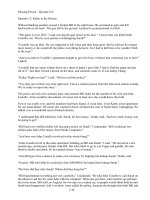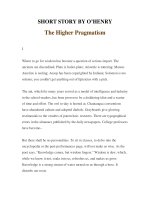Story-Factsheet
Bạn đang xem bản rút gọn của tài liệu. Xem và tải ngay bản đầy đủ của tài liệu tại đây (69 KB, 2 trang )
Penguin Readers Factsheets
Teacher’s Notes
The Missing Coins
by John Escott
Summary Communicative activities
Background and themes
About John Escott
The Missing Coins is a mystery story. Pete and Carla are students.
visiting the city of Bath in England. While they are walking around
looking at the shops and buildings they hear music in a quiet
street. A man plays a flute. He is standing next to the window of a
shop which sells coins and stamps. They go into the shop and
have a look. Pete wants some stamps, but they are expensive and
the girl shop assistant is unfriendly. Pete and Carla then go to a
café for a drink.
To their surprise, the coin shop owner comes to find them there. He
says that some of his coins are missing. He thinks Pete and Carla
have stolen them. A policeman proves that they have not taken
them.
Later, Carla hears the music again. She realises how the coins.
were stolen: The girl in the shop is friends with the flute player. She
drops the coins into the flute player’s hat through the open window.
Carla explains this to the policeman.
The shop owner is so pleased with Carla and Pete that he gives
Pete the stamps that he wants.
Mystery: The story has a mystery, which the students can try and
work out by looking at the picture on page 2.
Tourists: Crime is often found in big cities, where tourists and
other visitors stay for a short time.
Feelings: Before the mystery starts. Carla feels that there is
something wrong about the shop when they go in.
John Escott is an experienced EFL writer, who lives in the south
of England. He has written many original stories for both Penguin
Readers and Penguin Young Readers and also for other
publishers.
© Pearson Education Limited 2002
The following teacher-led activities cover the same
sections of text as the exercises at the back of the Reader.
BEFORE YOU READ
1 (a) What do students like to do when they visit a city for the
first time?
(b) Which are the students’favourite cities? Why?
(c) Ask students in groups to think of a city they know and tell
the class what is good to see there.
2 Do one of the following activities, a or b, with the students.
(a) Divide the class into two groups, A and B. Group A
chooses a picture but doesn’t tell B which it is. They
describe it. B decides which page it is. Then B chooses
another picture and describes it to A who then say which
it is.
(b) The class are divided into two groups, A and B. Group A
choose a picture. B must find out which picture it is by
asking Group A questions. Examples of questions are: Is
there a car in the picture? How many people are in the
picture?
AFTER YOU READ
Students should choose to be either the policeman or the man with
the flute and tell the story from their point of view.
abbey city coin flute pocket shopkeeper stamp tourist tune
collect valuable speak pretty surprised outside missing last
next minute steal
Extra words
There are twenty extra words, in addition to the 300 headwords
used in each Penguin Readers Level 1 title. The extra words
used in this title are:
© Pearson Education Limited 2002
ACTIVITIES BEFORE READING THE BOOK
1 Match the words in list A, with the meanings in list B.
A
(a) valuable (b) pretty (c) last (d) minute (e) surprised
(f) collect (g) missing (h) tourist (i) tune (j) s t e a l
(k) outside (l) next (m) city
B
(i) a visitor who is on holiday
(ii) a song or piece of music
(iii) there are sixty in an hour
(iv) the opposite of first
(v) good to look at
(vi) not in the place where you think it will be
(vii) costs a lot of money
(viii) immediately after
(ix) to take something from a shop and not pay for it
(x) not inside
(xi) get things and bring them together
(xii) when something happens that is different, it makes you
this
(xiii) a large town
ACTIVITIES WHILE READING THE BOOK
1 Find these things in the pictures. Write down the page
number(s) where you see them.
abbey flute hat coin shopkeeper pocket stamp
2 Answer the following questions.
Pages 1-4
(a) What is the name of the city in England in the story?
(b) Who wears a green sweatshirt?
(c) What is the first question Carla asks?
(d) Where do they go after they see the man and his flute?
(e) What does the shop sell?
(f) Which does Pete like in the shop, the coins or the stamps?
Pages 5-9
(g) How old are the coins in the shop?
(h) Why does the shopkeeper leave Pete and Carla alone?
(i) Pete likes some stamps. Which countries are they from?
(j) Do Pete and Carla sit outside or inside the café?
(k) Why does the shopkeeper come to find Pete and Carla?
(l) Who says “What’s wrong?”
(m) A student is working in the shop. What is the name of the
student?
Penguin Readers Factsheets
Student’s activities
Pages 10-15
(n) Where does the shopkeeper look for the coins?
(o) At first, where does the policeman think the coins are?
(p) Why does the music tell Carla what happened?
(q) Who do Carla, Pete and the policeman look for?
(r) Where are the missing coins?
(s) How does the shopkeeper thank Pete?
3 Choose ‘Which? Who? Where? When? Why? for these
answers and make question.s
eg Peter wants the stamps from South America.
Which stamps does Peter want? Or Who want the stamps
from South America?
(a) Peter and Carla go into the shop. (who or where)
(b) The missing coins are in the hat.(where)
(c) The shopkeeper is angry (why)
(d) A police car came after some time. (when)
4 Choose the correct word.
(a) Old coins are very valuable/surprised.
(b) Bath is an old stamp/city.
(c) The missing coins are in his pocket/flute.
(d) It is raining inside/outside.
(e) The policeman looks for the coins in her pockets/shoe.
5 Put the sentences in the right order to describe how the stolen
coins get out of the shop.
(i) She drops the coins into the hat
(ii) She puts the valuable coins in her pocket.
(iii) She opens the window.
(iv) He plays his flute next to the shop window.
(v) He stands next to the shop.
ACTIVITIES AFTER READING THE BOOK
1 In pairs, imagine you are in a shop. One of you is a
shopkeeper. Your stamps are valuable. When people touch
them, they make them dirty. They sometimes steal them. But
you want to sell them and make some money.Your partner is
a student. She/He has no money, but he/she wants to look at
the stamps, because they are pretty.What do you say to each
other. Use pages 4-5 to help you.
2 Write a letter to one of your friends telling them about the city
of Bath
3 Write five headlines for the newspaper, e.g. ‘Shopkeeper says
“students steal coins”.
Published and distributed by Pearson Education
Factsheet written by Rose Hill
Factsheet series developed by Louise James









